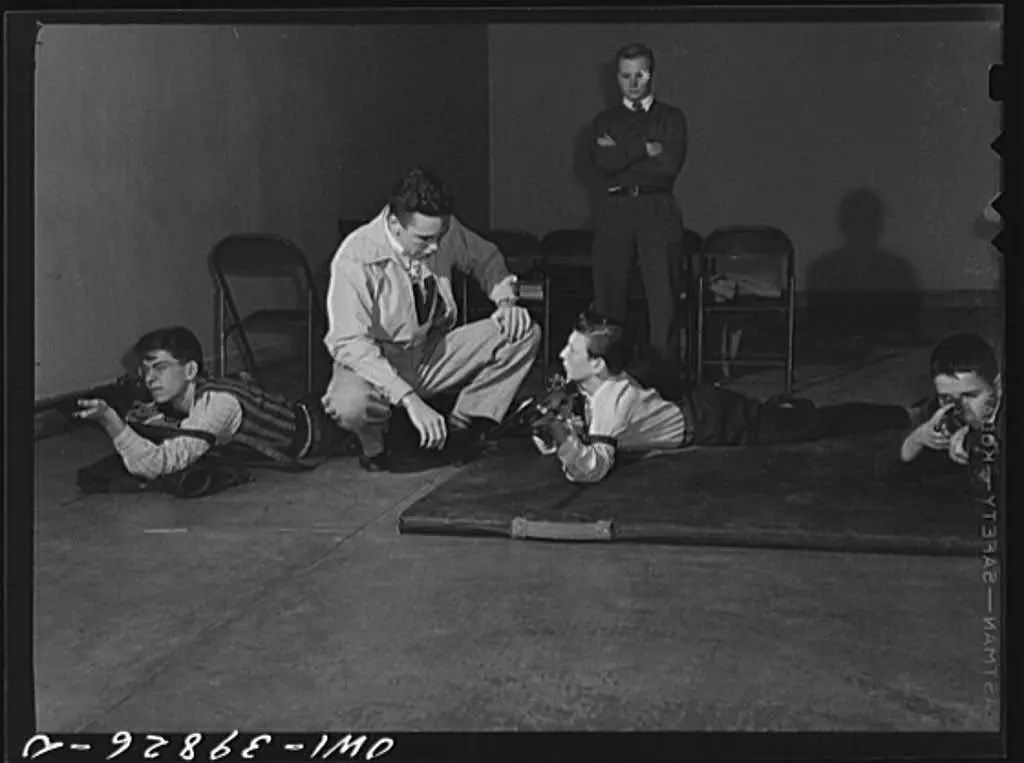School rifle teams are nothing new. An October 1943 archival photo shows Walter Spangenberg giving some pointers to new members of the rifle club at Woodrow Wilson High School in Washington, D.C. (Photo by Esther Bubley/Retrieved from the Library of Congress)
Reports indicated that Thomas Matthew Crooks, implicated in the July 13 shooting at a Trump rally in Butler, tried out for a school rifle team. Such teams aren’t uncommon in Pennsylvania.
“PublicSource is an independent nonprofit newsroom serving the Pittsburgh region. Sign up for our free newsletters.”
In the blizzard of profiles of Thomas Matthew Crooks following the July 13 shooting at a rally for former President Donald Trump, one of the many mysteries has been: Did the accused shooter try out for his high school rifle team?
Former classmates have told media outlets that Crooks — who was 20 at the time of the rally — failed to make the team. The Bethel Park School District has said it has no records showing any involvement Crooks may have had with the team.
The shooting resulted in an injury to Trump and two attendees and the death of Corey Comperatore. Crooks was also killed.
PublicSource asked: How prevalent are high school shooting teams, and where do they fit into society’s ongoing discussion of gun safety and violence? Here’s what we learned.
How many area districts have organized rifle activities?
Sixteen school districts participate in Western Pennsylvania Interscholastic Athletic League’s [WPIAL] rifle tournaments in the region, where the sport has grown in recent years.
Participating school districts in WPIAL’s rifle tournaments
| Avella |
|---|
| McGuffey |
| Trinity |
| Bethel Park |
| Waynesburg Central |
| Mt. Lebanon |
| Washington |
| West Greene |
| Hempfield Area |
| Plum |
| Upper St. Clair |
| Woodland Hills |
| Armstrong |
| Butler |
| Penn-Trafford |
| Indiana |
PublicSource reached out to all of the schools, seeking comment on the teams, and received no replies.
Jim Stoker, president of the Firearms Owners Against Crime, a nonprofit advocacy organization that deals with legal, legislative and education involving firearms, said he believes high school shooting sports have become less common in the last several decades.

He said many schools do not participate because they do not want guns on the school grounds, which has hurt the sport.
What is known about Crooks’ interaction with Bethel Park’s team?
Multiple reports have said Crooks tried out for Bethel Park High School’s rifle team but did not make it.

In an email statement, James Cromie, director of communications and public relations at Bethel Park School District, said Crooks may have attended a practice in 2018, but the district’s coach did not remember meeting him and the school had no record of him trying out for the team. His name never appeared on any team roster, he added.
What are the rules for school-sponsored firearms activities?
The WPIAL follows the National Rifle Association’s rules for smallbore rifle matches. Those rules emphasize safety — for instance, “Always keep the gun pointed in a safe direction” and “Always keep your finger off the trigger until ready to shoot.”
The NRA sets no bottom age threshold. The lowest age category is “sub-junior,” which tops out at 14. The NRA rules hold that all school-related teams have a captain and coach.
In a written statement, Matt Rodriguez, WPIAL’s chairman of rifle teams, said all teams follow strict safety procedures, including the use of empty chamber indicators, strict range commands, and a zero-tolerance policy with disobedience and horseplay. Each team conducts discipline checks on prospective members, he added.
What are the arguments for and against school rifle teams?
Some have argued that rifle teams reflect an enduring aspect of the Pennsylvania way of life and sponsor friendly competition.
Stoker contended that youth shooting programs educate students about responsibility and boost self-esteem.
“What’s key is that you’ve got to be able to teach firearms to youth shooters at the age level they’re capable of comprehending,” he said. “And on top of that, you’ve got to avoid politicizing it.”
Josh Fleitman, campaign director at CeaseFirePA, an organization working to end gun violence in the state, said while shooting sports may educate students and create a culture of responsible gun ownership, parents and educators should be aware of its risks.

“A lot of these programs value, prioritize safety. [It] is the No. 1 priority, and that is critical. But at a certain point, you can only make a deadly weapon so safe. They are inherently deadly,” he said.
Numerous studies have shown that gun ownership increases the risk of homicide, suicide and unintentional injuries.
Stoker said rifle teams have no connection to incidents like the July 13 shooting. “When you run into something like [the] shooting, you’ve got either a criminal intent or a mental health issue that no rifle team in the world is going to either solve or make worse,” he said.
Fleitman said while he is not opposed to extracurricular activities like shooting sports in schools, they may unintentionally expose young students to weapons and may not provide resources to be safe and responsible depending on how those activities are structured.
“I think we’ve just seen too many, too many sad examples of guns that fell into the hands of people who either clearly should not have had them or people who didn’t necessarily even outwardly pose a risk,” he said.
Editor’s note: This story was updated to include information received after initial publication.
Lajja Mistry is the K-12 education reporter at PublicSource. She can be reached at lajja@publicsource.org.
This article first appeared on PublicSource and is republished here under a Creative Commons license.

